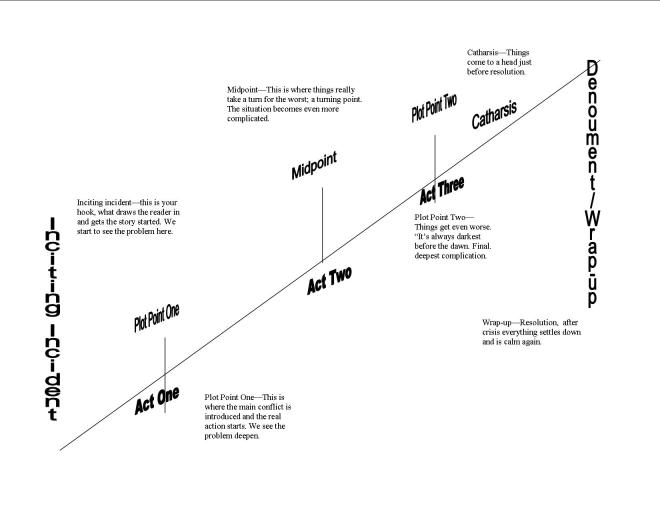Today’s world is ever-changing, adapting, mutating. If you see that glass half full, fine. If you see it half empty, then let’s suppose that a given new thing under your microscope hasn’t been fully fleshed out…yet. But to stay on point, what’s changed in the structure of stories, and why?
I won’t cover well-trod theoretical ground, except in passing. There’s Aristotle’s inverted check mark (or whatever else you’ve learned to call it), reproduced in one of its forms here:
 If you fancy yourself a writer and haven’t come across this, well, let’s be nice and just say you should study this diagram. But today’s writers are trifling with this structure, if not abandoning it altogether. Why? Since the era of Henry James, James Joyce, and the like, there’s been an increasing emphasis on characterization. Now I’m all for convoluted stories, upsetting structure and time, and emphasizing character, but a complete surrender to casual characterization can only work under certain conditions.
If you fancy yourself a writer and haven’t come across this, well, let’s be nice and just say you should study this diagram. But today’s writers are trifling with this structure, if not abandoning it altogether. Why? Since the era of Henry James, James Joyce, and the like, there’s been an increasing emphasis on characterization. Now I’m all for convoluted stories, upsetting structure and time, and emphasizing character, but a complete surrender to casual characterization can only work under certain conditions.
Full disclosure: when conceiving my first novel, I had only a vague idea of where the story should go. I spent most of my time developing my characters (even walked around my condo, acting them out). As it turned out, my characters determined the direction of the novel, and that direction was the story. So no matter how you devise a piece of fiction, there should always be some vestige of story.
All right, then, what are the rules to structuring fiction in our postmodern world? The thing to consider here is that in our world of flux, your responsibility, dear writer, can be summed up in perhaps two things:
- What your characters confront should challenge your readers’ deeply held convictions. In a world of change, life, even in fiction, should have meaning. Being willing to leave the past is only half the solution, though; meaning much be transformed as well.
- As a corollary to the above, the writer must change the way his/her readers see the world, it’s failings, its urge to move toward the future’s promise.
A caution: Reading is a private act. Have you ever read a book in your teen years, then read it again in your middle years and discovered new perspectives, new slants on old perspectives? Do you wonder why Emma Bovary maintains such a hold on modern readers? Do you wonder why the pre-revolution world of Tolstoy’s writing seems so relevant today? That Mark Twain’s tweaking of prigs’ noses works as well today as then? It’s the writer’s inspiration, if one is a true talent, to be able to reach beyond good and bad, beyond belief and certainty, into the always changing nature of the human essence. If reading were anything other than a private act, reaching such depths, allowing the alternative worlds of fiction to displace one’s certainties would be all but impossible.
If you seek simply to write dogma, whether it be social, religious, political, or historical, you’re not writing fiction. If you have an agenda of cut-and-dried good and bad, fiction isn’t what you’re doing.
But in all that the muses give you in the way of inspiration and talent, remember: whatever you write will be incomplete without the movement of life – and that’s what story is all about.
Visit my website here. Then there’s my FB Fan Page here. On both you’ll find more on ideas and events that matter to me — and possibly to you.
Leave a comment